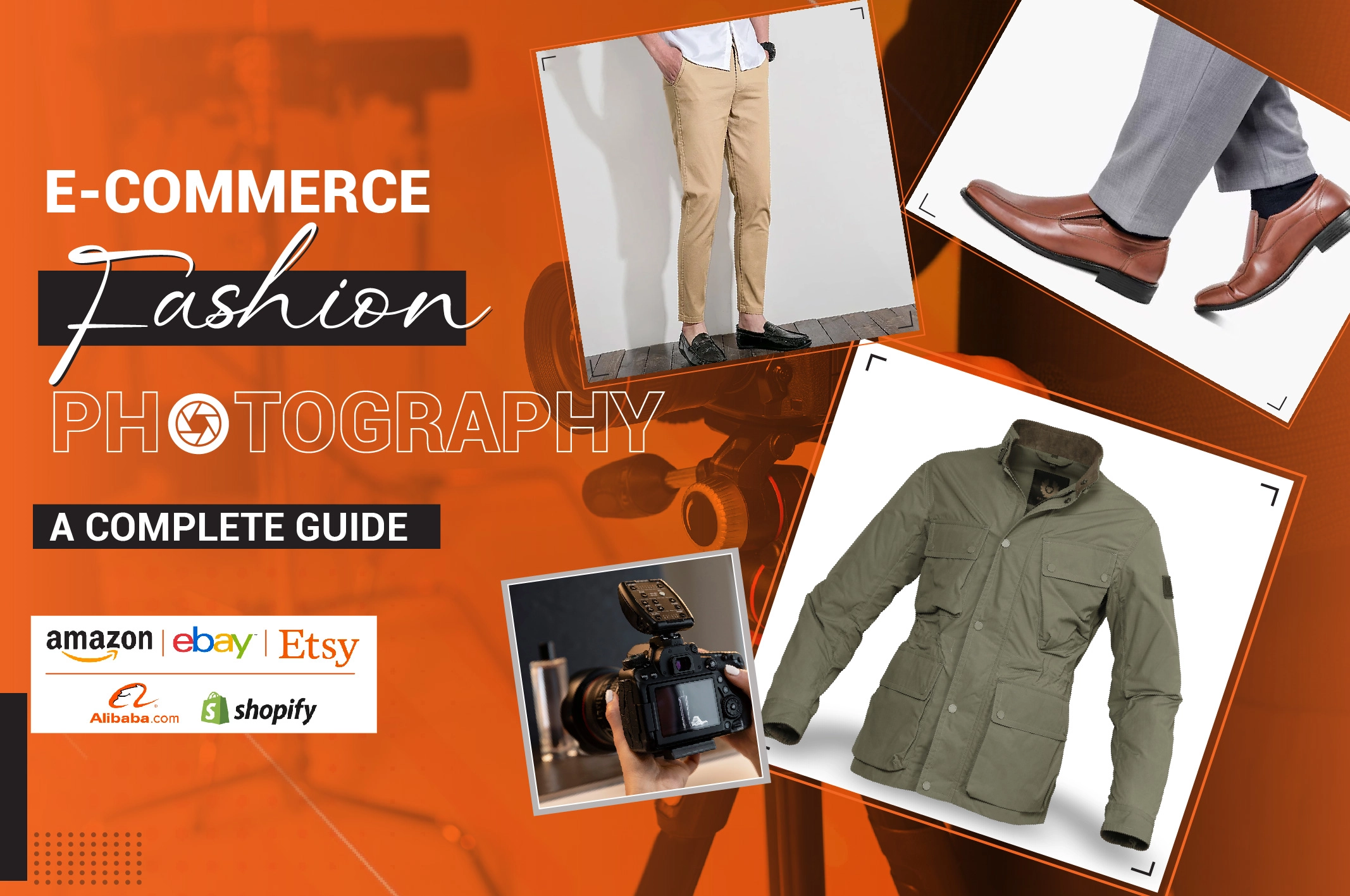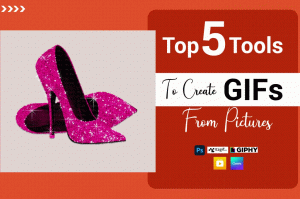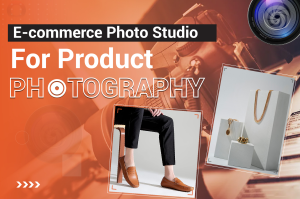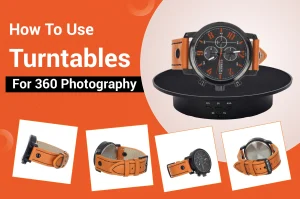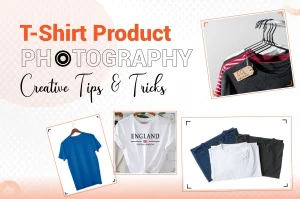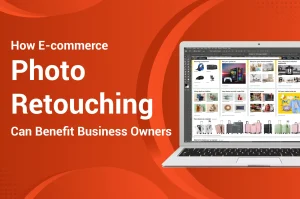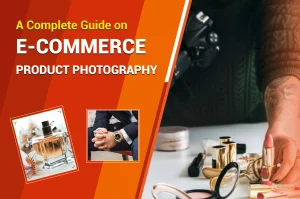The online fashion industry is highly competitive. If someone wants to sell products online successfully, the fashion product images should be appropriately captured. The visual representation of clothing items greatly influences customers’ interest and buying decisions. High-quality photos are not only for showcasing products; they also create trust and have a long-lasting impact on the brand. Let’s explore the complete process of fashion ecommerce photography—from studio setup to advanced post-production—along with some professional tips.
Fashion eCommerce Photography Requirements for eCommerce Platforms
High-Quality Camera
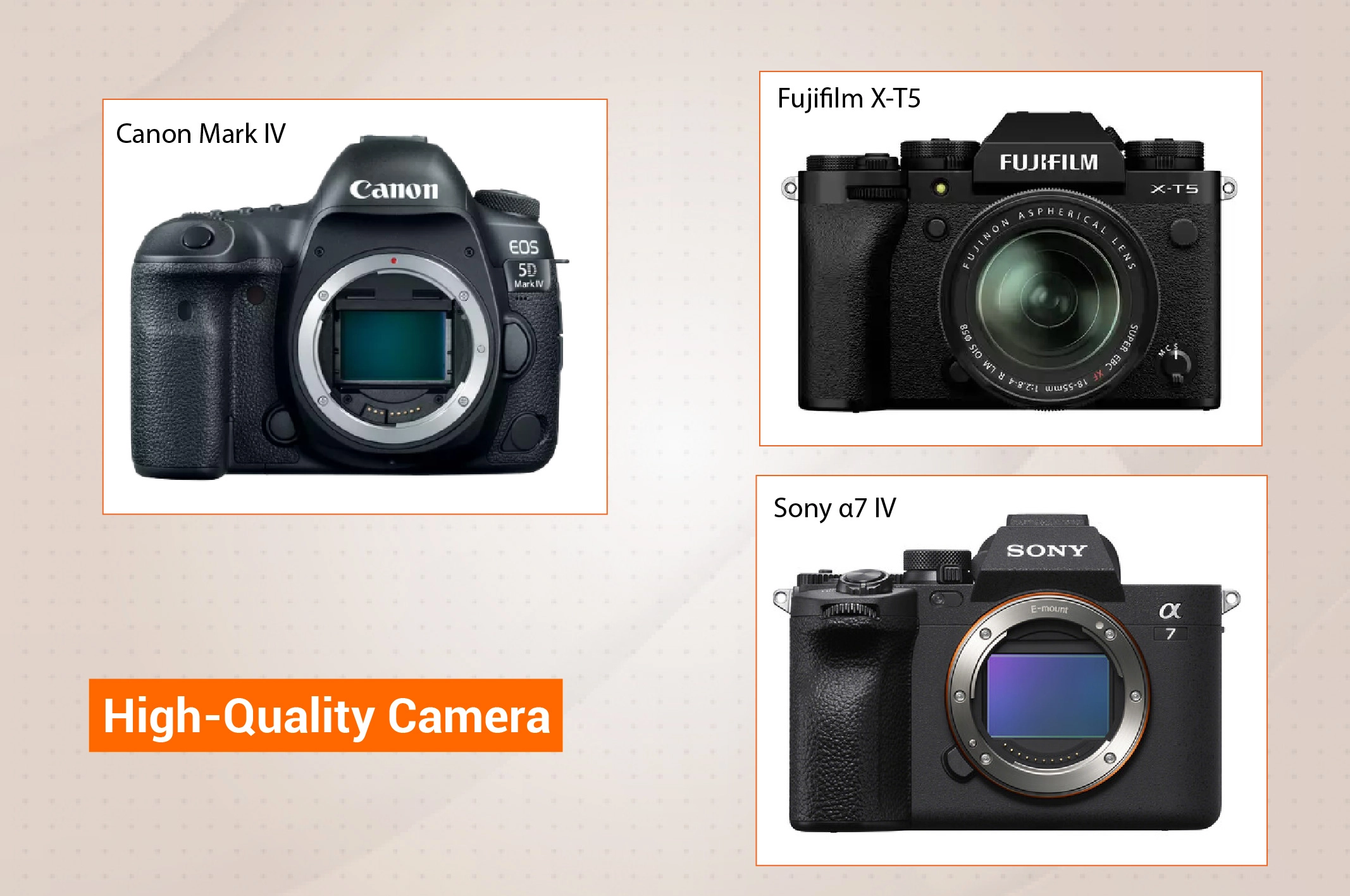
A high-quality DSLR or mirrorless camera is a basic requirement for e-commerce fashion photographers to take sharp photos of fashion products. When choosing a camera, consider focusing and low-light photography features.
Examples:
- Canon Mark IV
- Fujifilm X-T5
- Sony α7 IV
Tripod
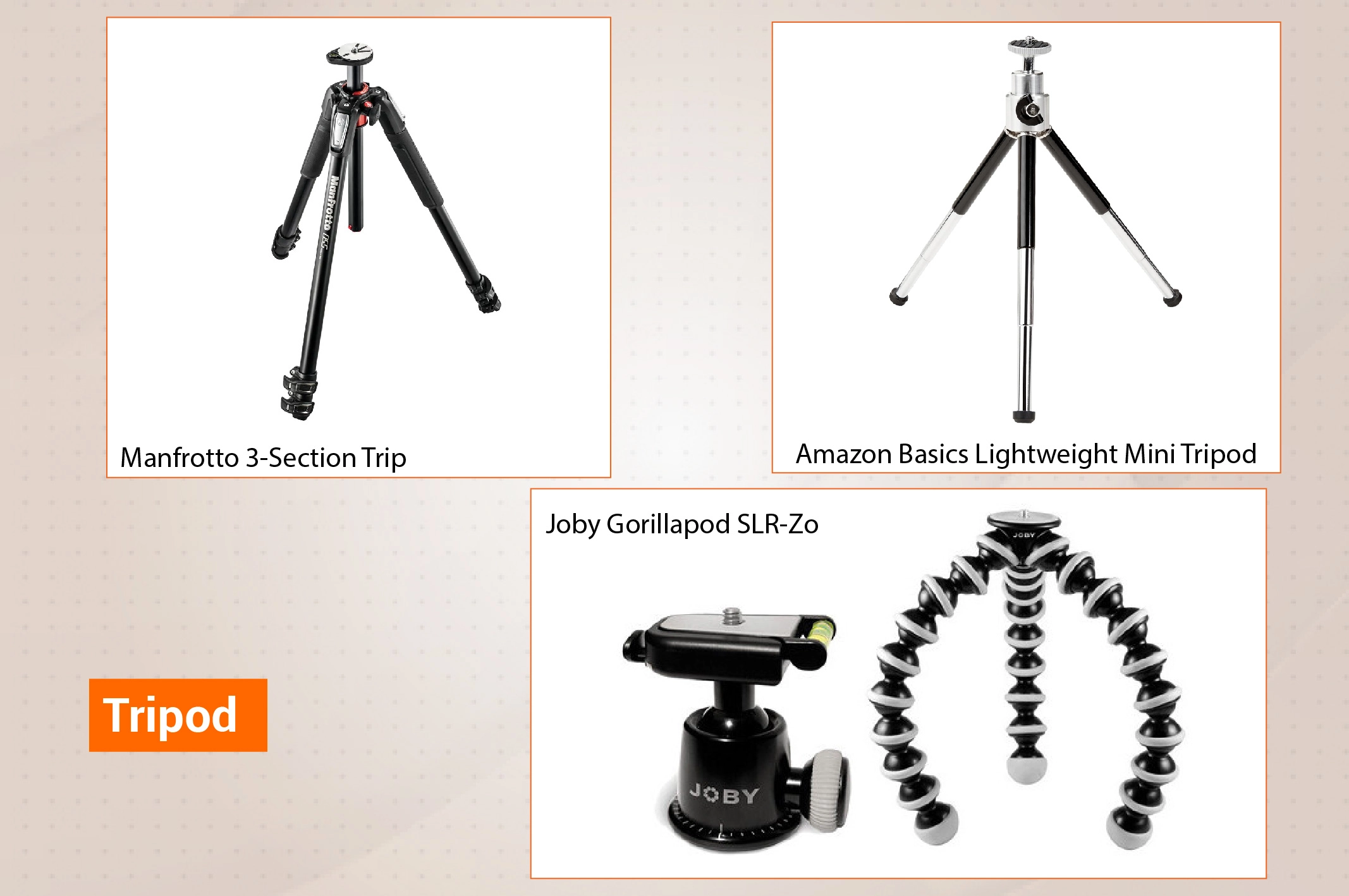
An accurate representation of the fashion product requires a steady camera. A sturdy tripod will do the job and avoid blurriness caused by camera shakes. A tripod is important for consistent photography and longer shooting sessions. For an easier setup, choose an adjustable tripod.
Examples:
- Manfrotto 3-Section Trip
- Amazon Basics Lightweight Mini Tripod
- Joby Gorillapod SLR-Zo
Lighting Kit
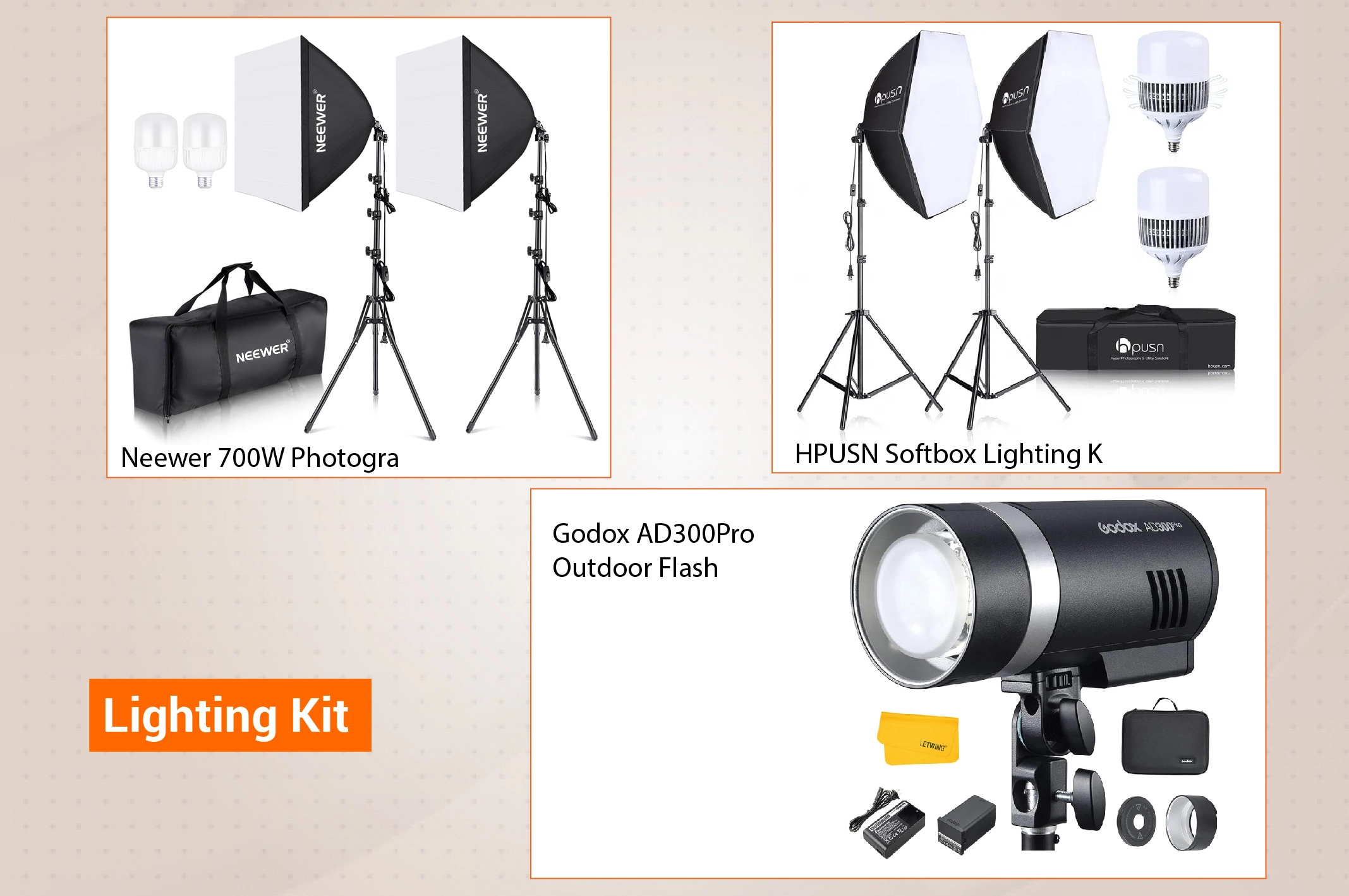
A proper lighting setup is needed for any kind of fashion ecommerce photography to illuminate the item correctly. Softboxes are a good solution to modern indoor photography, where these LED light boxes can create diffused lighting.
Examples:
- Neewer 700W Photogra
- HPUSN Softbox Lighting K
- Godox AD300Pro Outdoor Flash
Seamless Backdrop
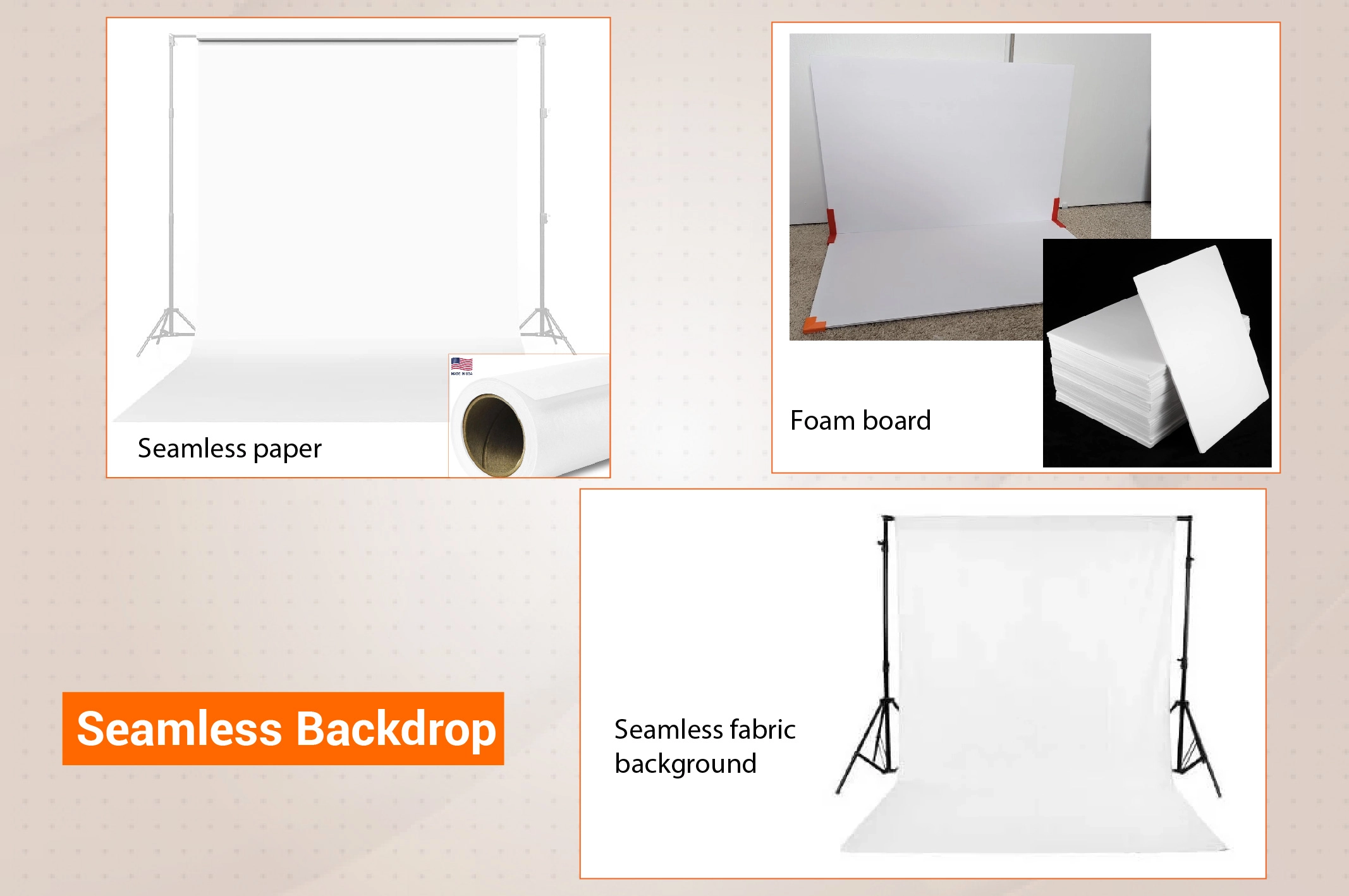
Backdrops are important for taking photos without any distractions and creating more focus on the subject. A plain white or neutral seamless paper or fabric backdrop is ideal for fashion photography.
Examples:
- Seamless paper
- Foam board
- Seamless fabric background
Reflectors
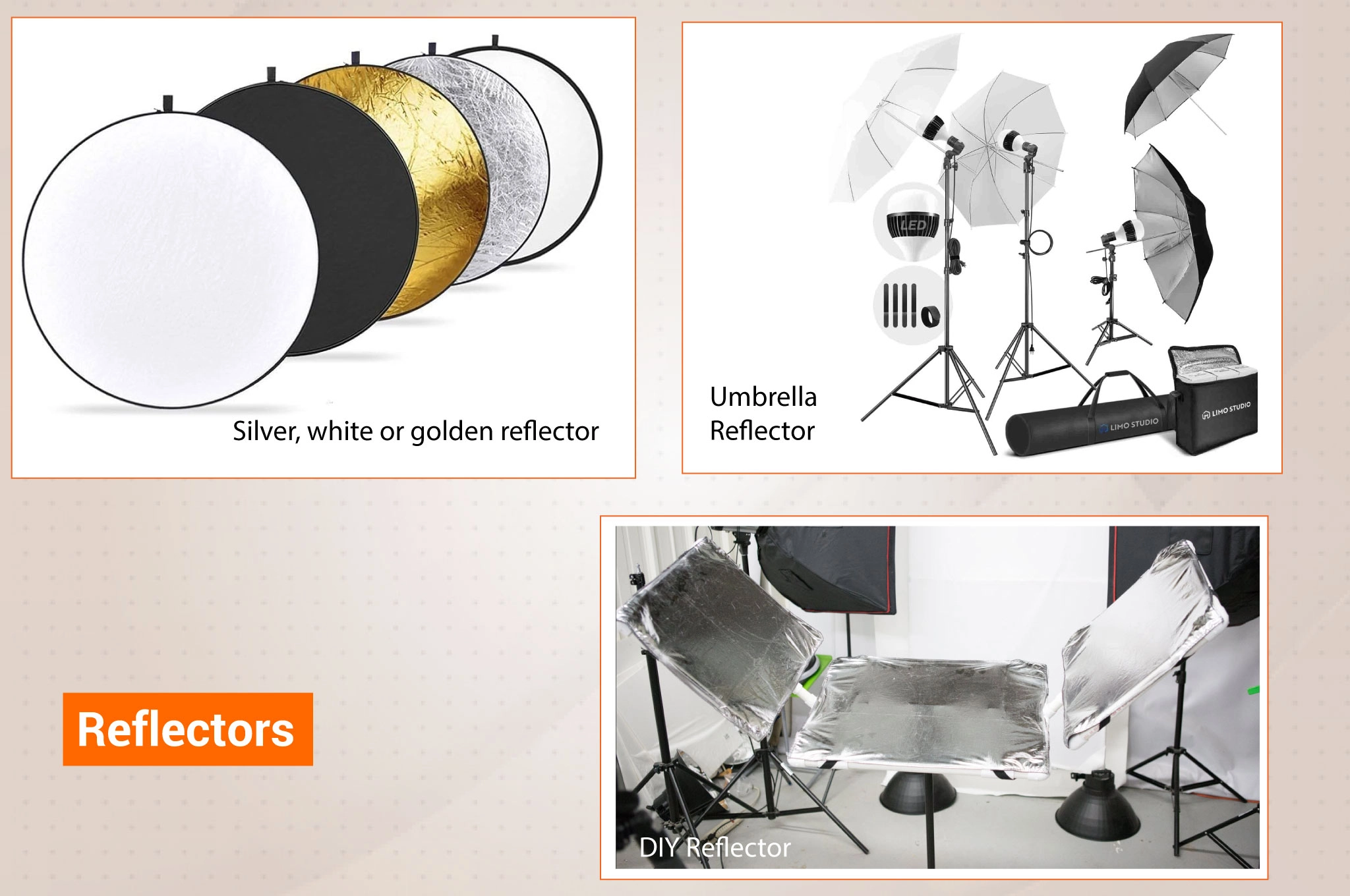
Reflectors control shadow and brightness in product photography by bouncing light on a target region. They are flexible and easy to adjust for varying lighting demands.
Examples:
- Silver, white, or golden reflector
- Umbrella reflector
- DIY reflector
Lens
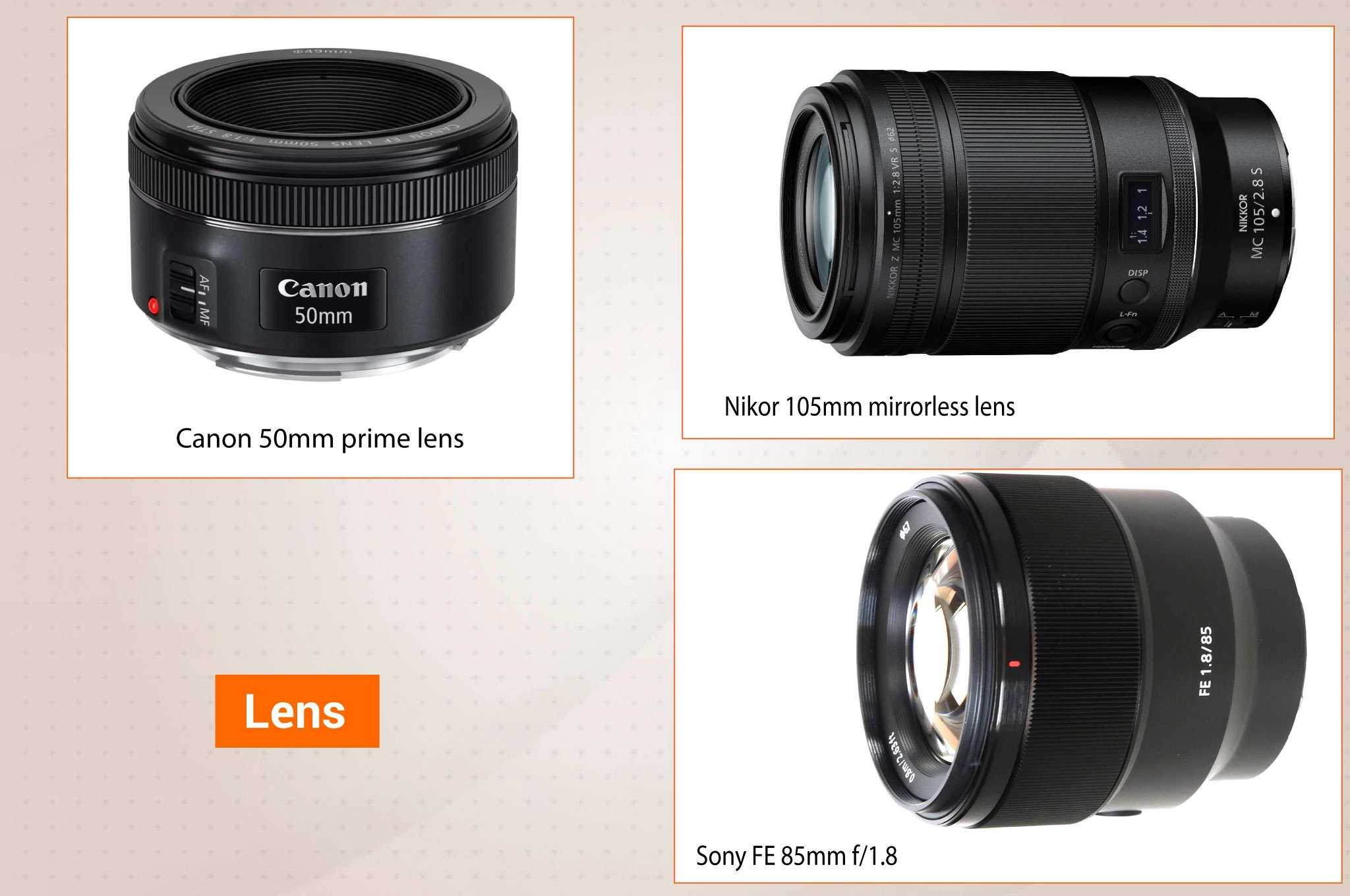
A prime lens is a basic need for any type of product photography. Additionally, you need wide-angle and macro lenses for a variety of photography needs.
Example:
- Canon 50mm prime lens
- Nikkor 105mm mirrorless lens
- Sony FE 85mm f/1.8.
Mannequin or Model
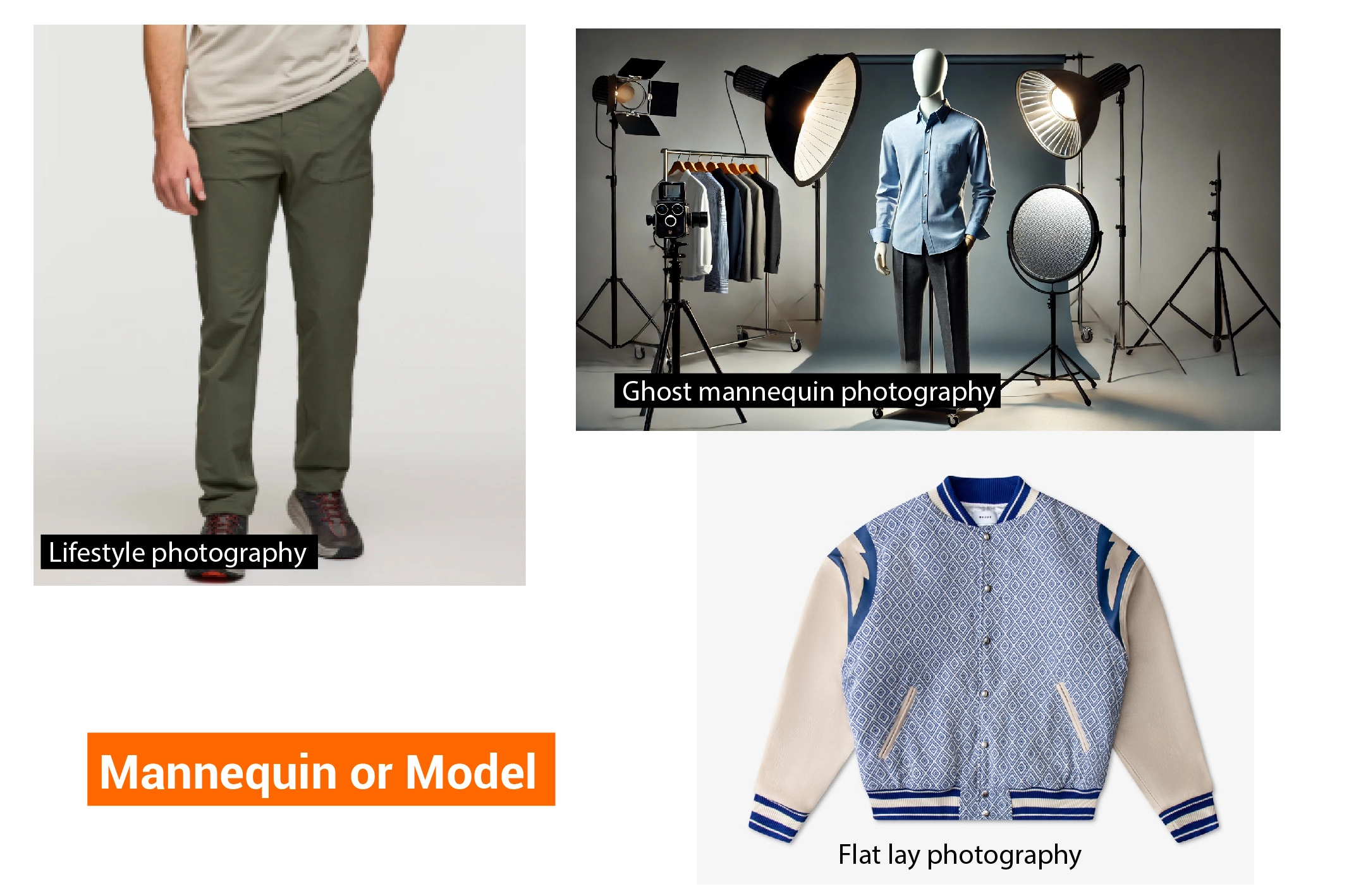
For specific fashion photography needs, human models or mannequins might be required. Make sure the clothing items perfectly fit the models and create a sense of realism.
Examples
- Ghost mannequin photography
- Lifestyle photography
- Flat lay photography
You may also like to read… Top 25 Unique Product Photography Ideas to Elevate Your Brand
Setting Up a Photo Studio for Fashion Product
Setting up the photo studio is crucial for successful fashion product photography. The studio should be customized specifically to branding requirements.
1. Choose the Right Space for Fashion eCommerce Photography
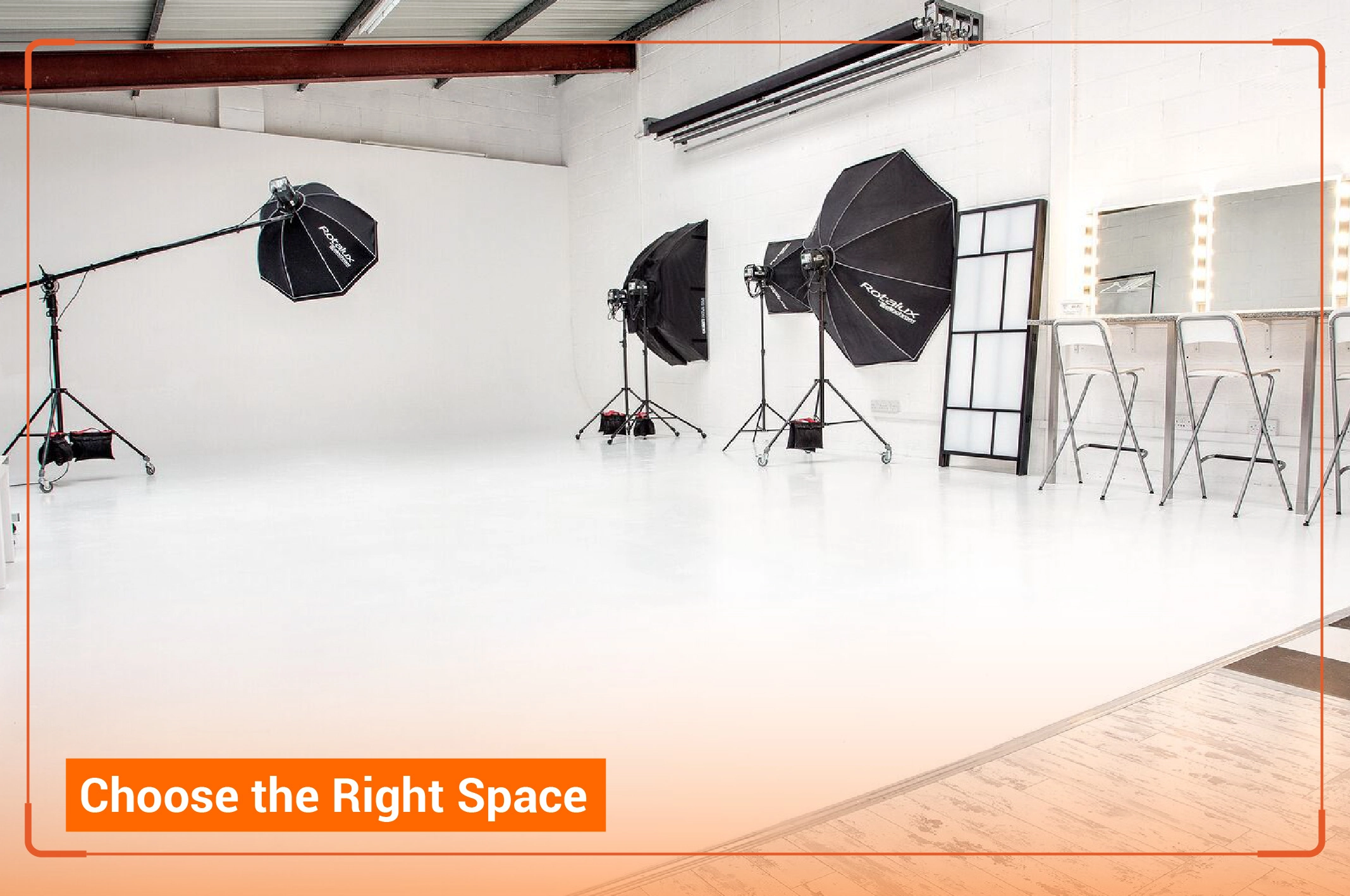
Choose the right space at the studio that allows you enough room for your photography activities. It should be spacious enough to accommodate all the photography equipment. A large window near the space will be an advantage as it will provide you with natural light.
2. Setting Up a Seamless Background
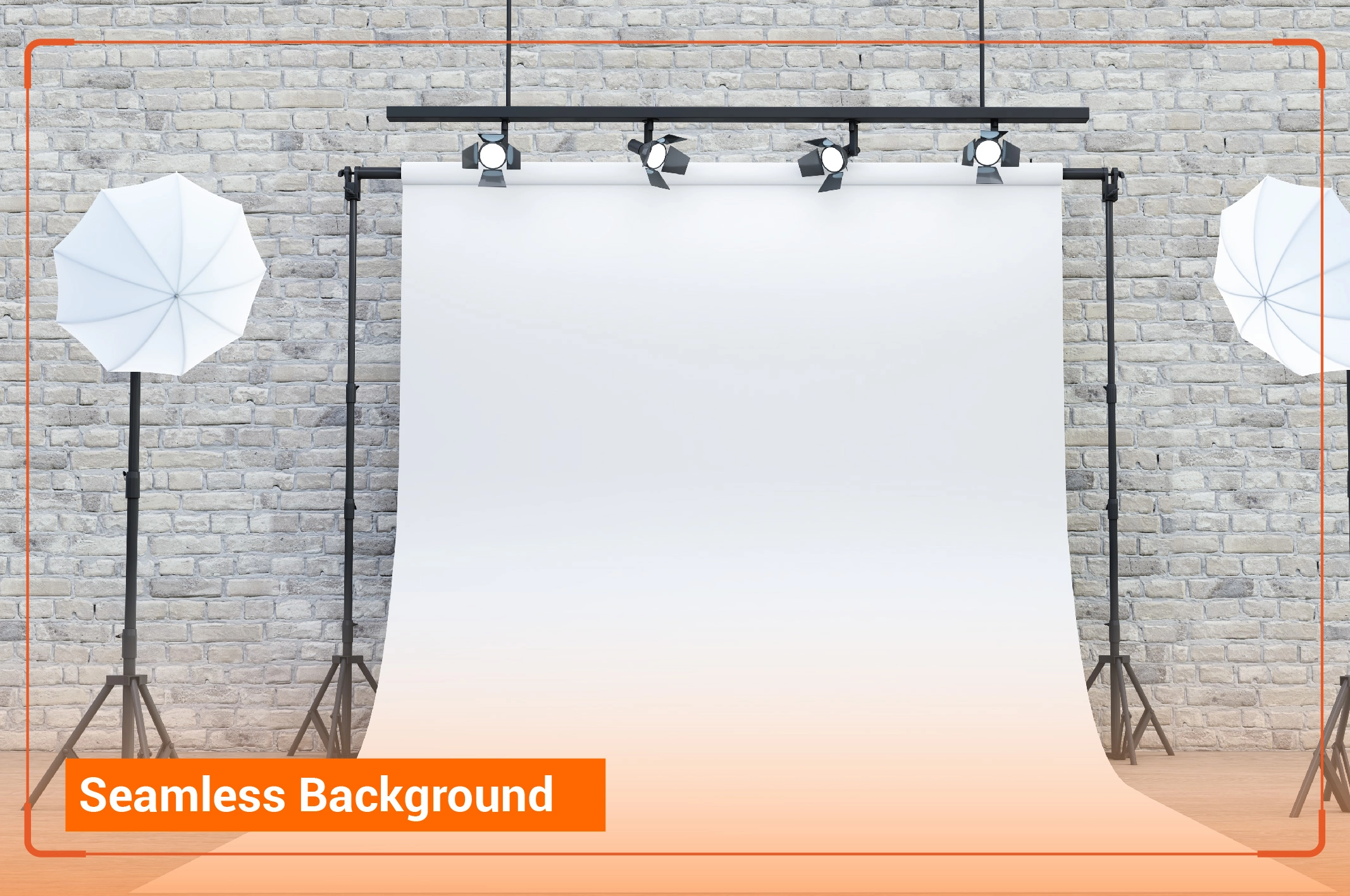
A solid white or neutral background is ideal for fashion ecommerce photography. A paper roll or fabric backdrop is suitable for this purpose and easy to set up. However, make sure the background material is clean and free from wrinkles. You can hang the backdrop on a stand. For smaller studios, collapsible backdrops are fantastic options. Use the same background to capture all the products and maintain consistency.
You may also like to read… How to Remove Background in Photoshop from any Image?
3. Setting Up Lighting Equipment
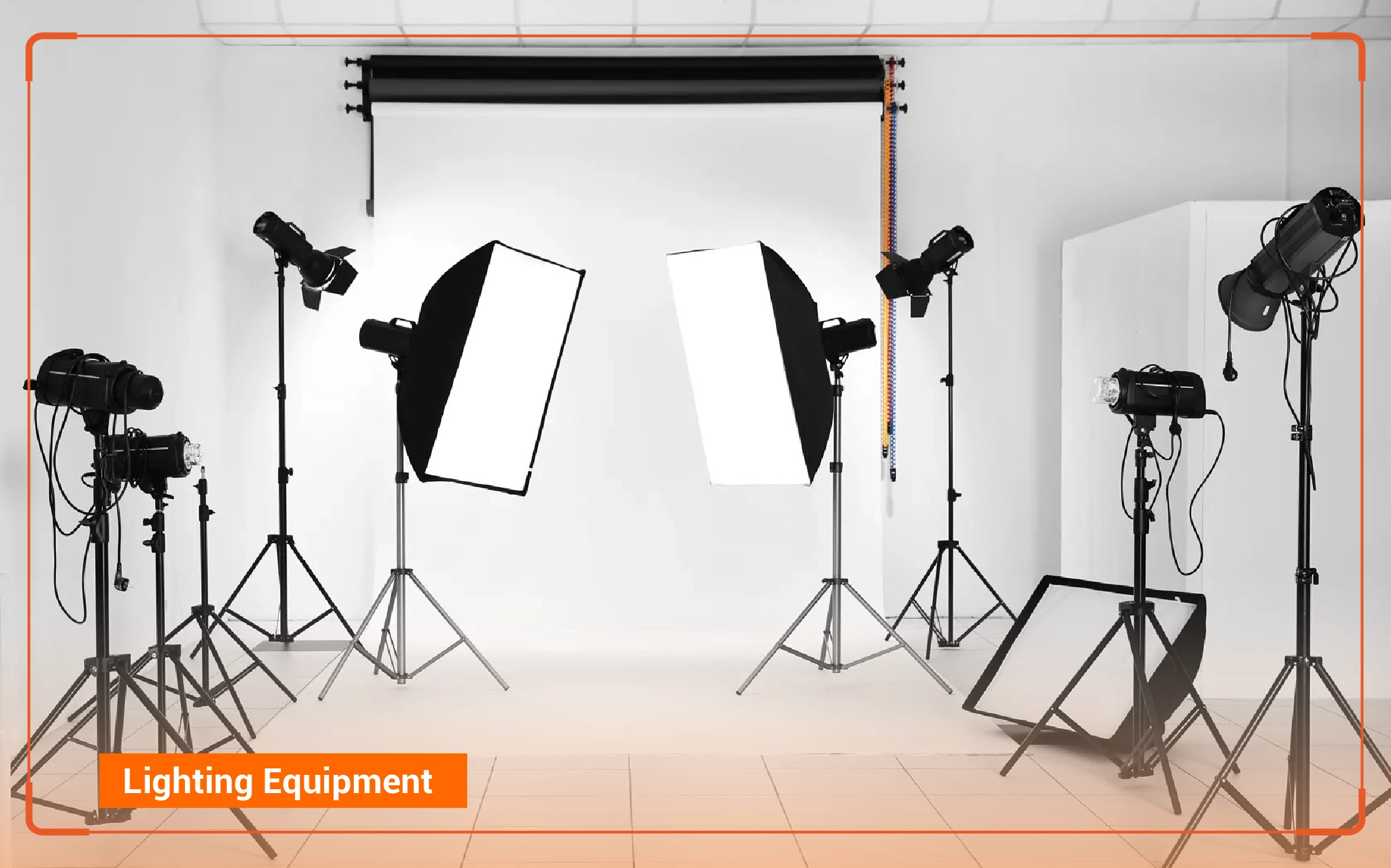
Lighting is an important aspect of fashion product photography. Bad light will cause dull, underexposed, and even overexposed images that fail to showcase your fashion products perfectly. For an ideal lighting arrangement, follow the three-point lighting as a common practice.
- Key Light: The first light placed directly onto the product. It is also known as the main or primary light.
- Fill Light: Usually cast from different directions to reduce shadows created by the key light.
- Backlight: Increases image depth & separates the product from the background.
Softboxes, ring lights, and LED panels are popular choices for fashion product photography.
4. Use a Tripod For Stability
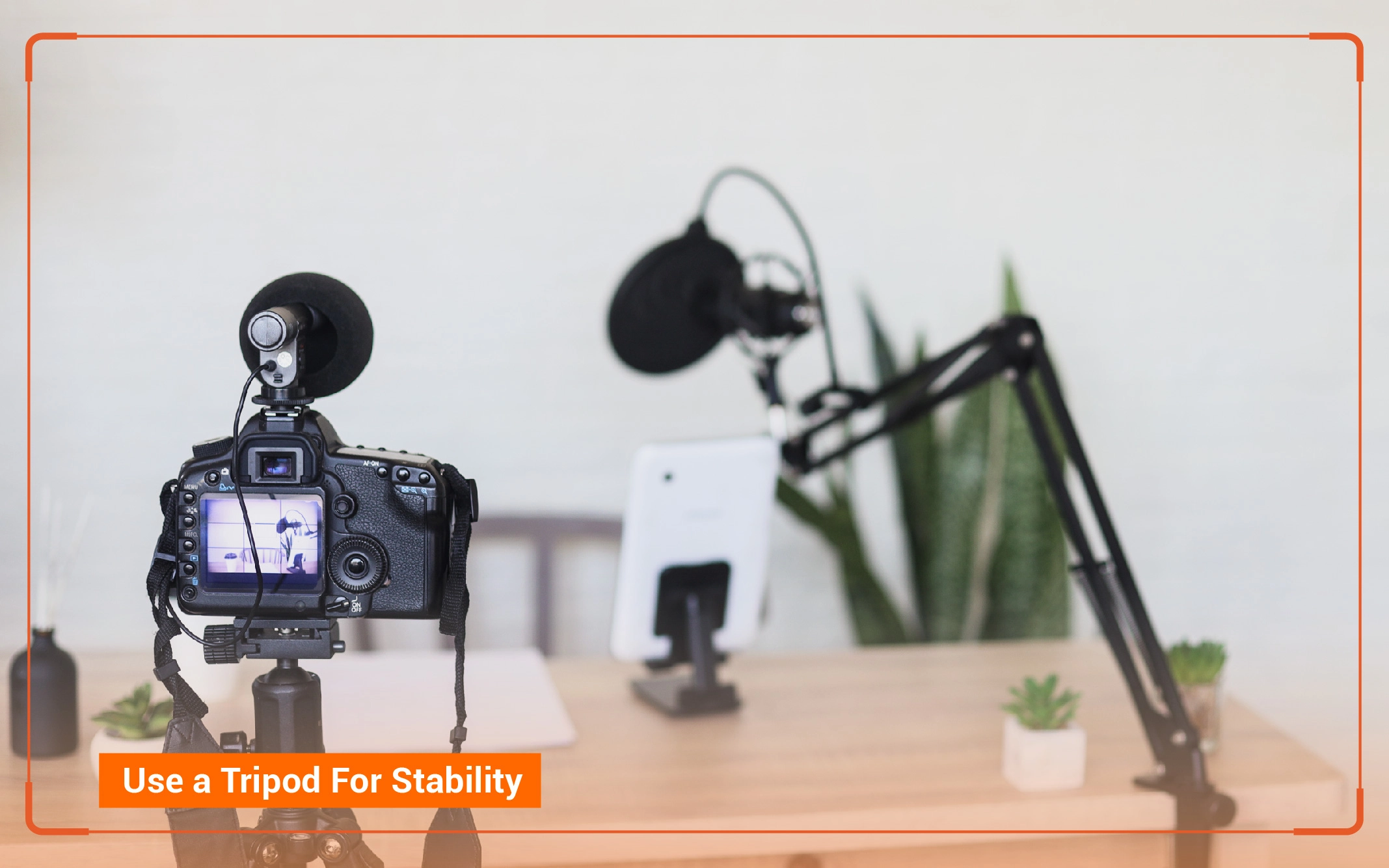
For fashion photography, a tripod is a mandatory tool for stability throughout your work. During long exposures or low-light conditions, having the camera fixed in one position is crucial. A tripod must have the flexibility to move freely at any desired angle and framing. In some instances, the tripod has to be kept at a fixed point to capture photos from the same angle.
A fashion ecommerce photographer needs to use a tripod that is easy to adjust. It should capture images from varying set angles, full body shots, close-ups of the fabric texture, stitching, and even delicate accessories.
5. Set up the Camera and Lens Wisely

A professional studio may have multiple cameras and lens options to choose from. When it comes to photographing fashion products, a camera with higher megapixel counts is required. You must need multiple lenses for taking a variety of photos.
6. Create Consistency with Guides and Markers
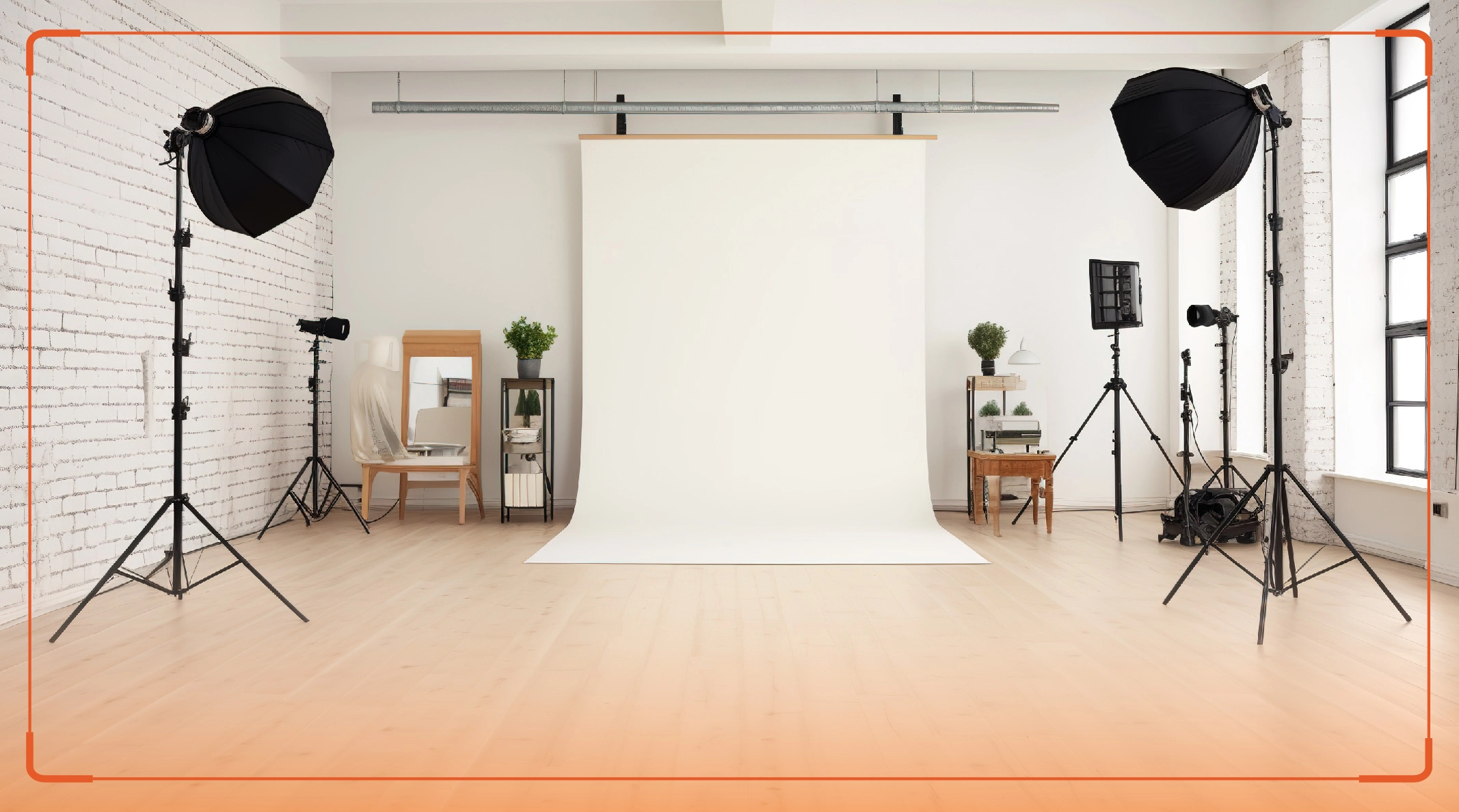
Use guides or markers to mark the position of each item in the photography setup. A floor marker is an essential item to maintain consistency. Markers ensure each element of the photography setup remains at the same position while you take photos of multiple products, while maintaining the same environment. The key to this idea is to keep the same lighting setup, camera settings, and even shooting angles for each product in order to maintain professionalism and appeal.
7. Post-Production May Be The Most Important Step
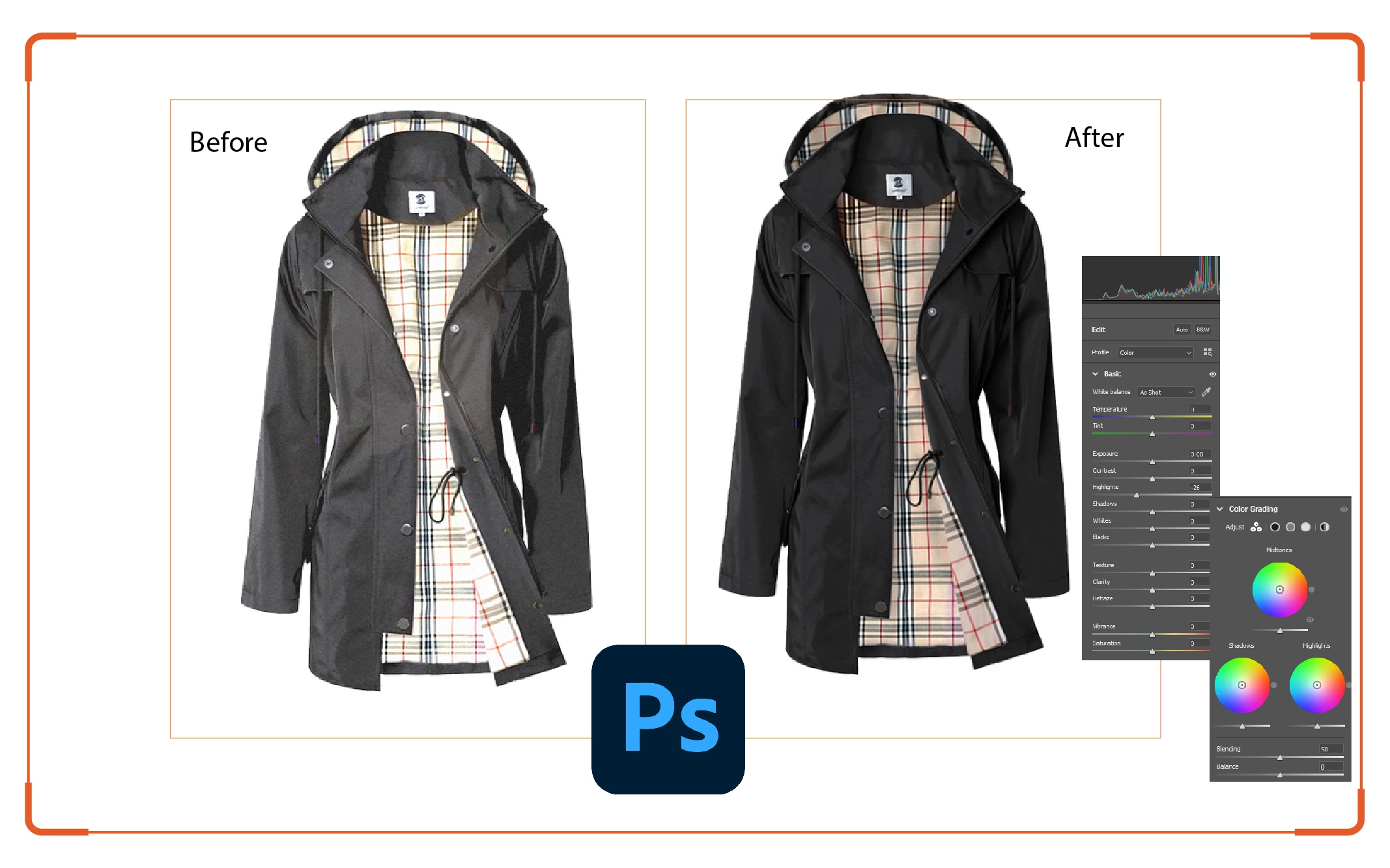
No matter how much effort you put into fashion photography, image editing plays a vital role in the process. After taking the pictures, use a professional photo editing software such as Adobe Photoshop for basic editing. You may also take post-production services for bulk image editing services at an affordable price..
You may also like to read… E-commerce Photo Studio: Key to Pro Product Shots
Fashion eCommerce Photography Best Practices
Be Mindful of the Fit and Styling of Garments
Make sure you are perfectly displaying the garments’ fit and style. The clothing should be free of wrinkles, and it must look attractive and presentable.
Check if the Colors are Correct
Online buyers can not physically check the color and fabric of the clothing. Therefore, the color has to be captured precisely for fashion photography. Use accurate white balance in color settings to match it with the actual product. Double-check the color in the post-production.
Take Pictures of Models for Better Understanding
Online buyers are interested in seeing how the fashion item looks when worn. Hence, use a model if you can afford it. A model can properly present the fit, scale, and style of the RMG item and help the buyers make a confident buying decision.
Try Out Many Angles and Poses
Try different poses from different angles to create versatile fashion photos. You do not know which angle the viewers are going to love. Taking multiple photos will also give you more options for promoting on social media.
Capture Important Product Features
Customers care about a few features, such as the fabric quality, stitching, buttons, and design pattern, when buying clothing items online. Try different shots, such as close-up and zooming, to highlight these features so that the customers can properly value your item.
Maintaining Consistency
Consistency is the key to establishing a brand and creating a lasting impression on the buyer’s mind. The photography mood, lighting setup, branding element, background and styling should be similar for all the photos you take for different items.
The Importance of Fashion Product Photography in E-commerce
Fashion photography is equally important for online and offline promotion. Below are a few reasons why sellers should consider this:
- Building trust: Professional and high-quality fashion photos displayed on websites, social media, and ecommerce platforms build trust and credibility.
- Increases sales: Products showcased with attractive and accurate images are more likely to sell out compared to those that lack appealing visuals.
- Reduces returns: Customers who are purchasing fashion items online are highly dependent on product photos. Inaccurate presentation with unprofessional photos creates dissatisfaction and increases returns.
- More social media engagement: High-quality photos of fashion products increase social media reach. These photos capture more attention and customer engagement.
- Branding: From the branding perspective, properly captured fashion photos create consistent branding across the platforms and create a lasting impression.
- Improves product perception: Fashion product photography gives customers access to visualize the design, fitness, and style of the product, which is essential for decision making.
- Social sharing: People love to share high-quality and attractive product photos. It increases the visibility of the brand and reaches it to more potential customers.
Fashion eCommerce Photography Ideas
Flat Lay Photography
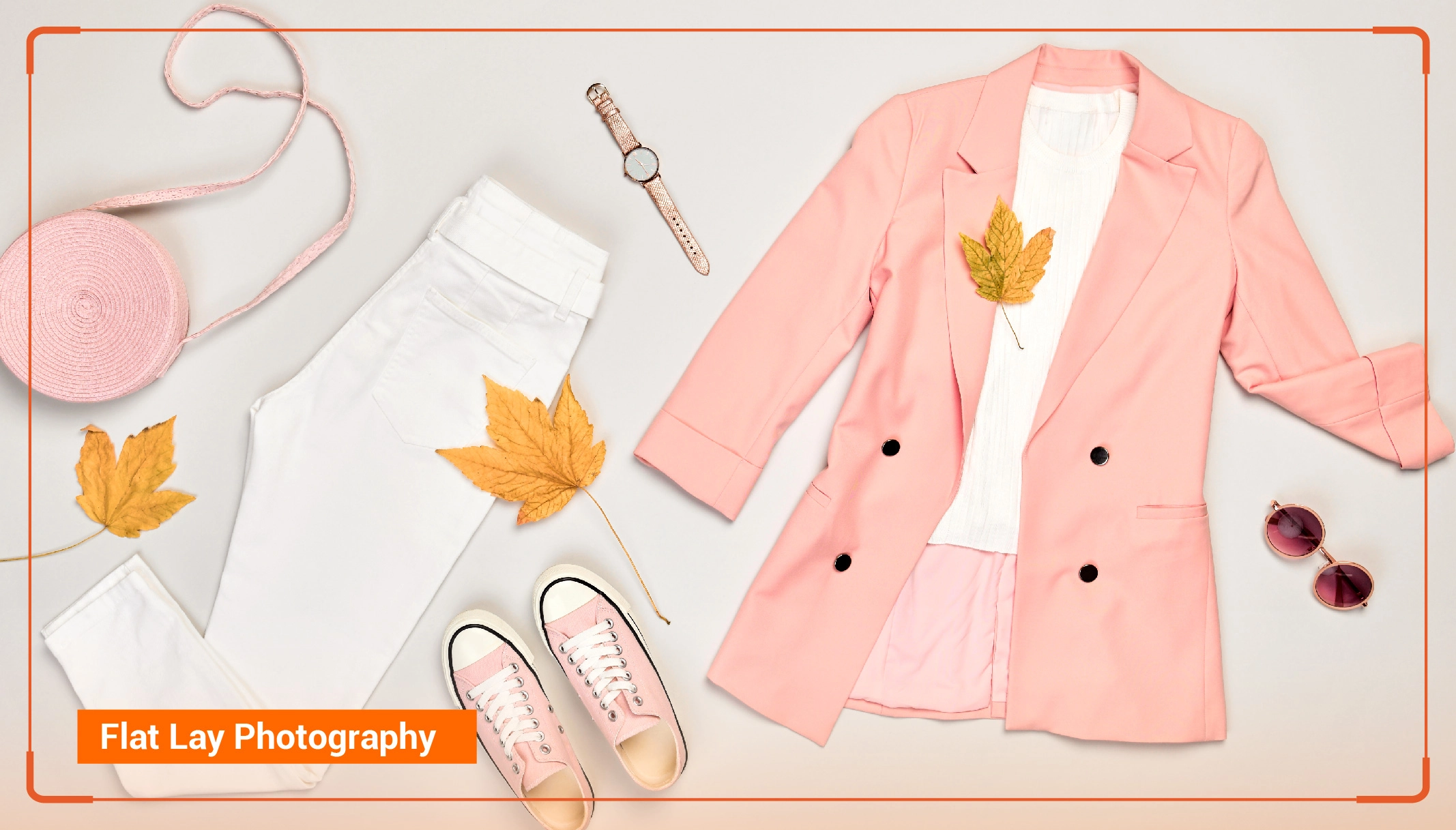
Flat lay is a popular way of taking fashion items where the products are placed on flat surfaces, arranged neatly, and captured. This photography technique is perfect for presenting clothing, shoes, and accessory items. For example, you can take pictures of dresses using shoes or jewelry as props.
Mannequin Shots
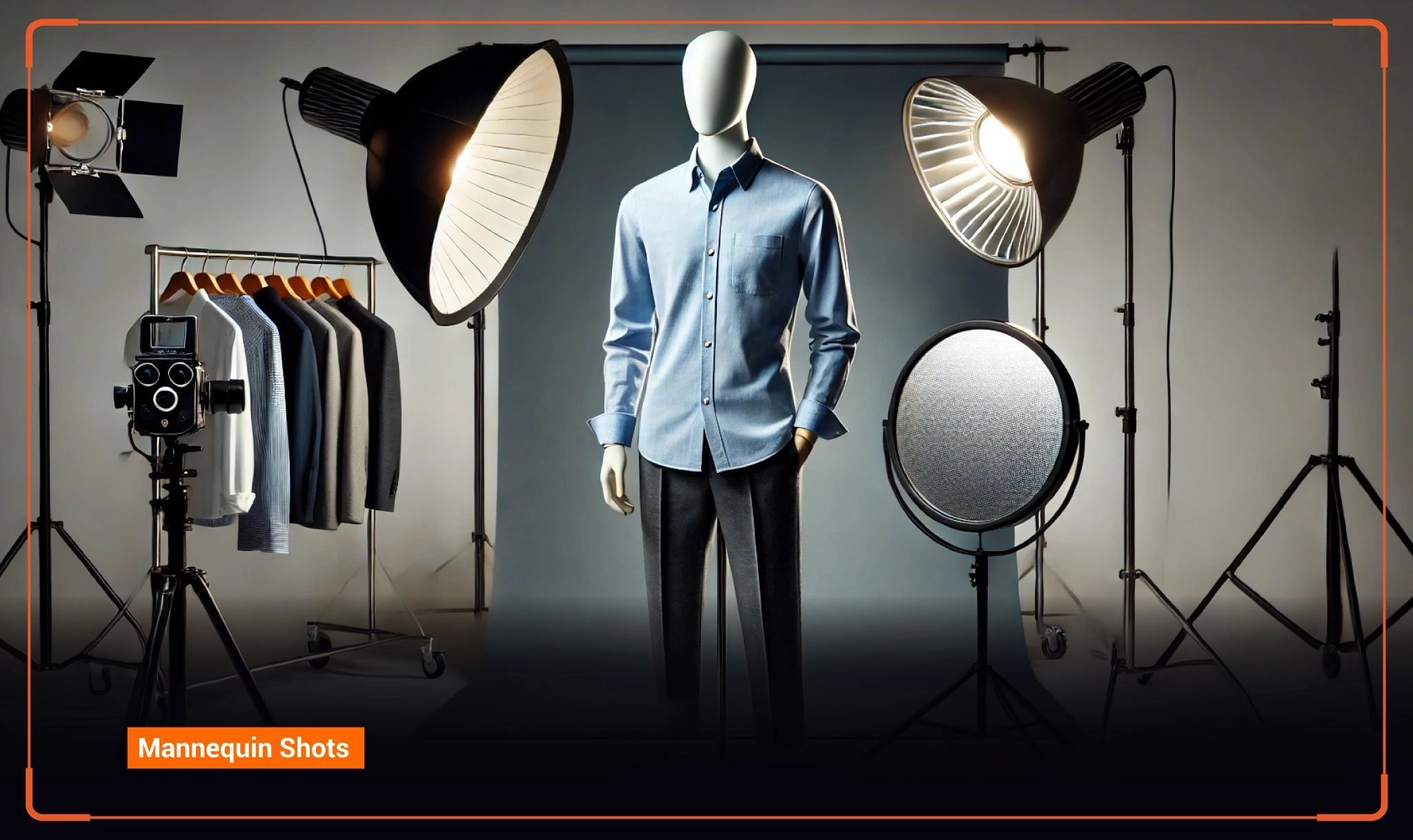
Taking clothing photos on mannequins is a great idea if you are taking a high volume of shots without a live person. This photography technique will show the fit of the garment in the most cost-effective way.
Lifestyle Photography

Take photos of apparel products in life scenarios to give the viewers an idea of how the items will appear in real life. For example, take photos of a model wearing a coat on a busy city street to portray the product in a relatable environment.
Ghost Mannequin Effect
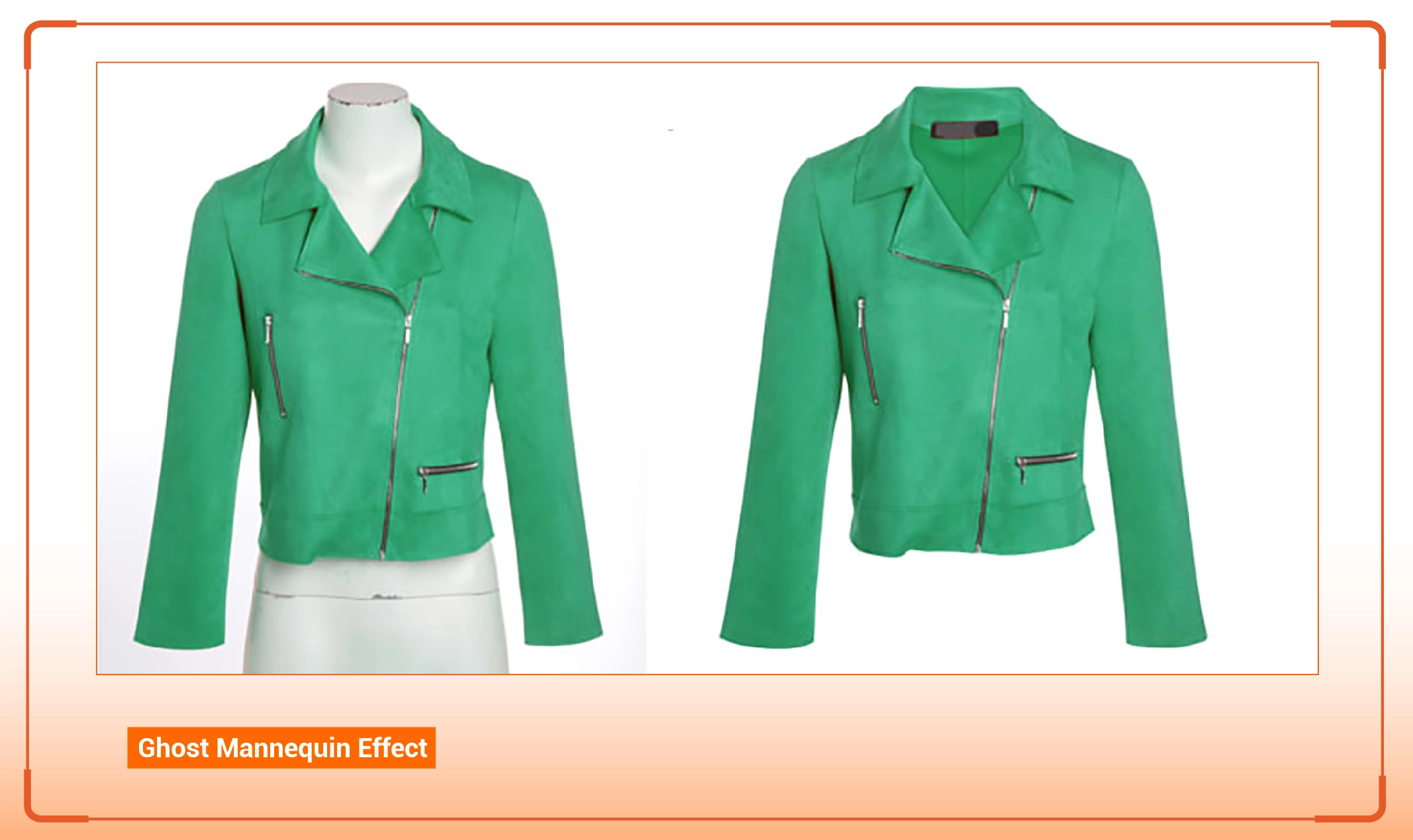
Take a photo of the fashion items on a mannequin and delete the visible parts of the mannequin in post-production. For example, take a photo of a jacket on a mannequin. Then delete the distracting parts, such as the collar, hand, and neck area of the model, using photo editing techniques. This is a great way of showing clothing’s fit without using a human model.
360-Degree Photography
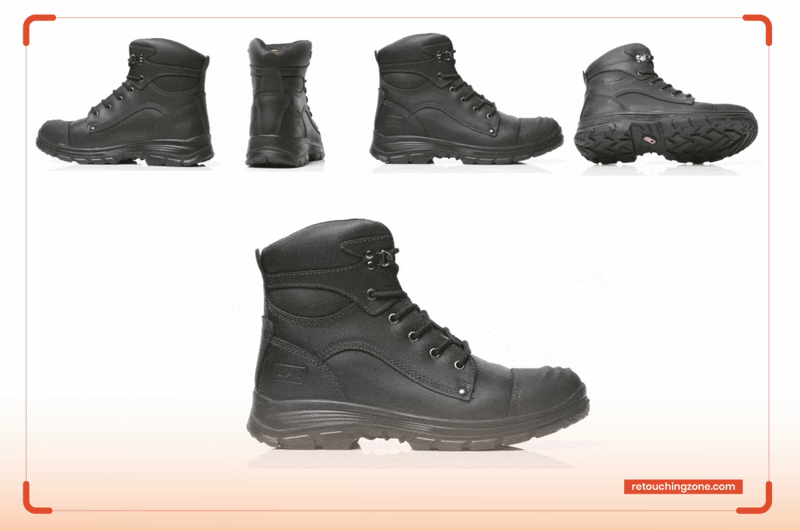
360-degree product photography allows the viewers to see the item from all angles. Here, the photographer takes shots from different perspectives and then merges the photos in post-processing. For example, use a photography turntable to take photos of a high-heeled shoe to give the customers a better understanding of the product.
You may also like to read… How to Use Turntables for 360° Product Photography
Close-Up Detail Shots
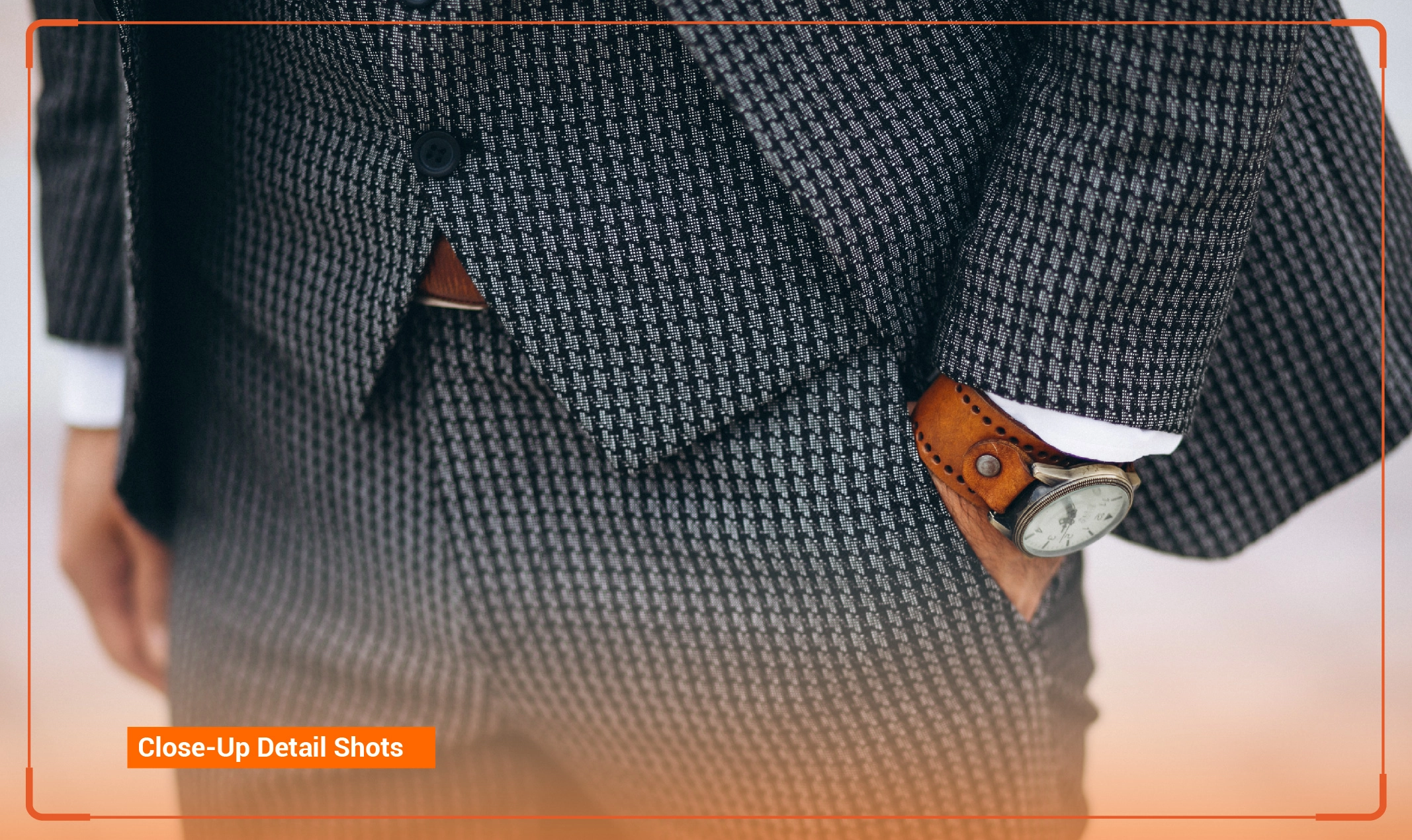
Close-up shots are perfect for presenting fine details of the product, such as stitching, buttons or zippers. This photography style is also appropriate for luxury fashion items. For instance, you can take a zoomed-in shot of a handbag to portray its uniqueness.
Studio Shots on Models
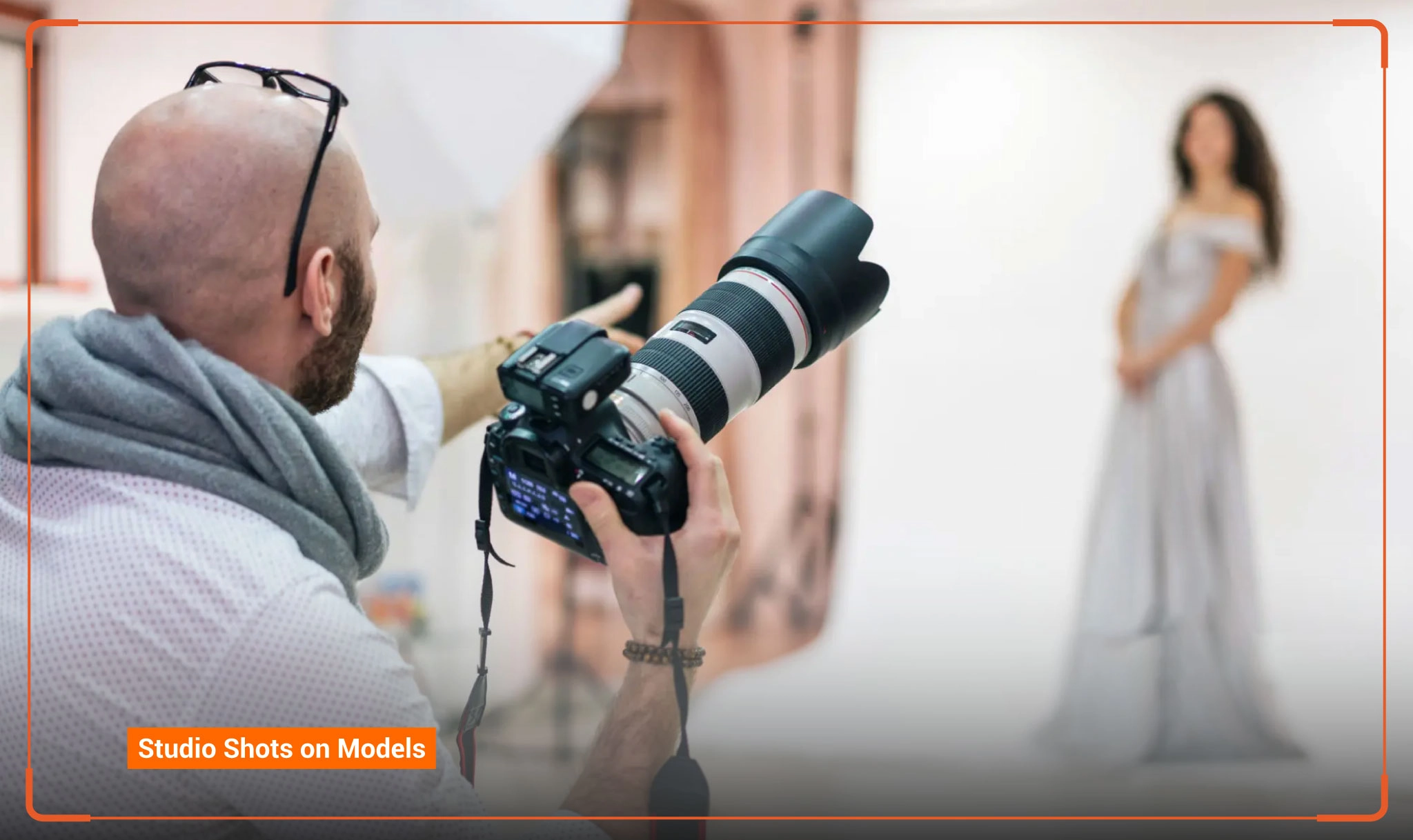
Use a human model in a studio to show how the fashion item will look when worn. It will give the customers a clear idea of the fit and style of clothing products. For example, a model can wear a summer dress and stand in front of a white background. It will clear contrast, and the viewers will clearly understand the color, shape, and fit of the product.
Seasonal or Thematic Photography
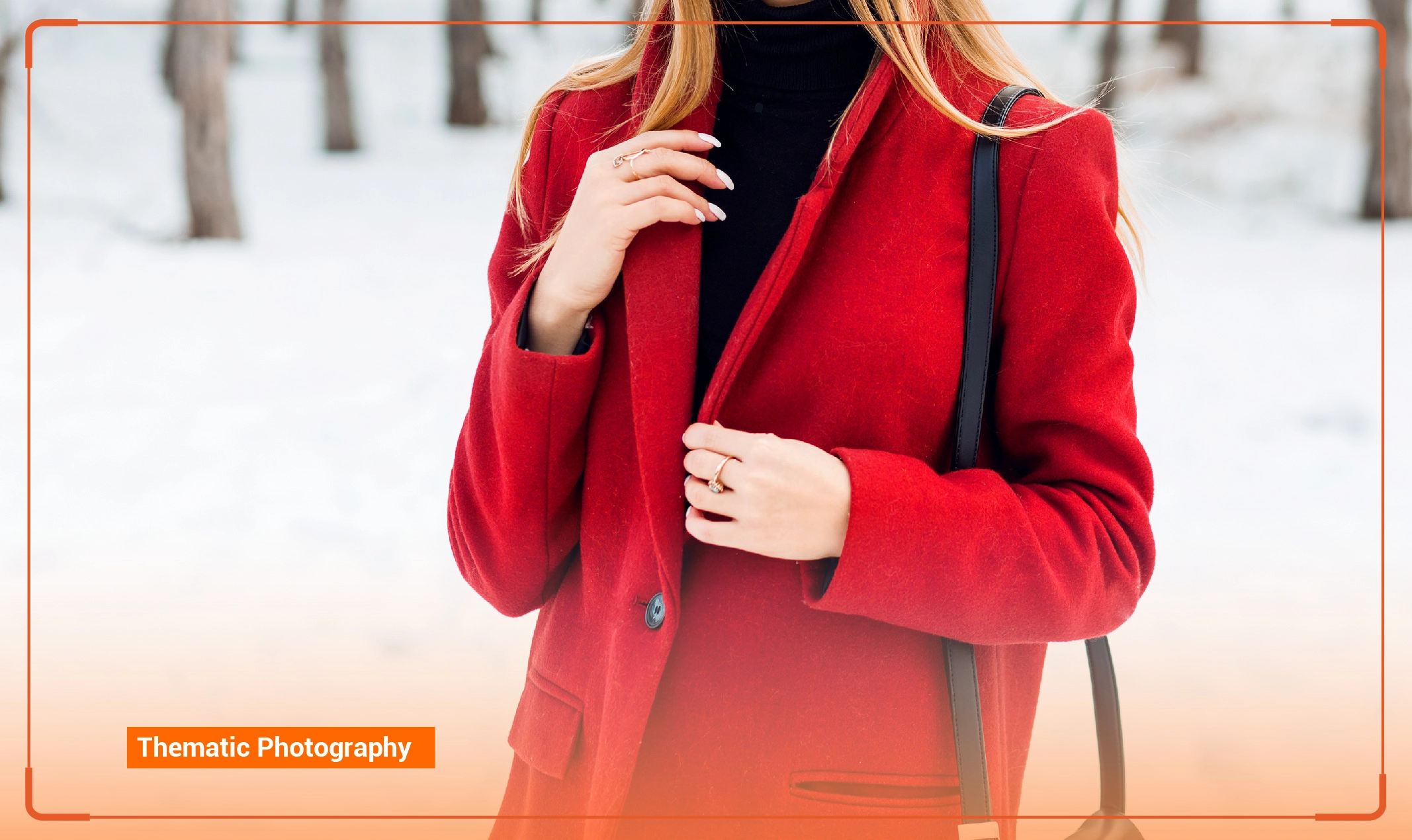
This type of photography is perfect for depicting a product related to a particular theme. For example, photoshoot a coat and scarf in a snowy setting. It will capture the product along with the season’s emotion.
FAQ
-
What do I need to be an e-commerce fashion photographer?
Trendy fashion sense is a prime requirement to become a fashion photographer. Additionally, basic photography knowledge and equipment is also essential.
-
What do I need to do in order to make my fashion product images more appealing?
Try different techniques such as taking photos from different angles, promoting special features, and utilizing lifestyle photos. Do not forget to retouch the photos before using them for marketing campaigns.
-
What color should I make the background for fashion photography?
Try to use a solid neutral color such as white or gray. These colors create high contrast against most colors and showcase professionalism.
-
Do I need to use models for fashion ecommerce photography?
Using human models for fashion photography is a good practice. Models can show the proper fit and style of the product in real-life situations. It helps increase the buying intention of the viewers.
-
How do I edit fashion ecommerce photos?
Anyone can make basic adjustments to a photo with a photo editing software. However, for advanced and bulk image editing, it is ideal to hire professionals.
-
Why is editing important for fashion ecommerce photography?
Photo editing increases the visual appeal of the product. Photographers can not always take photos in ideal situations. Hence, basic to advanced image editing becomes necessary.
Conclusion
The success of e-commerce in the fashion industry largely depends on the quality of product photos. Great images create trust, increase customer interaction, and result in quick growth. By following photography best practices and applying the right image editing techniques, you can present your brand in the best possible way. Putting time and effort into fashion ecommerce photography will ensure an accurate and attractive presentation of the products. It will ensure a better customer experience and brand reputation.
